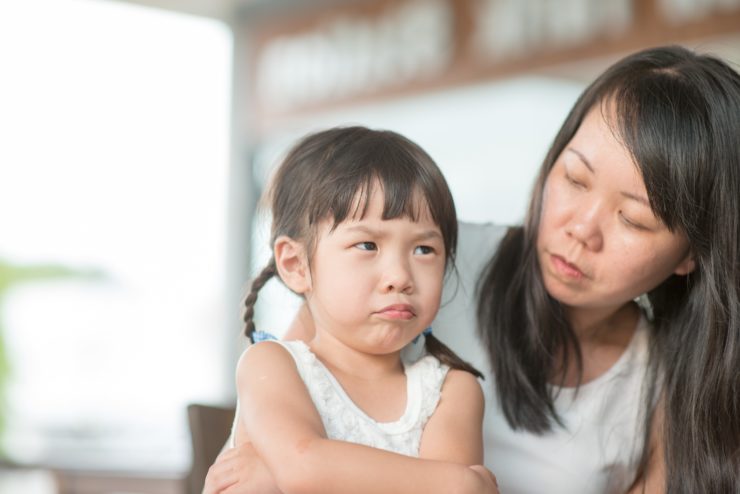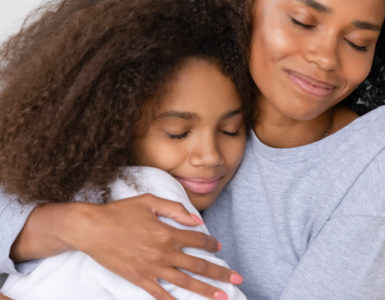Here’s what to do when your child says ‘I hate you.’
You love them, cuddle them, and take care of them. Yet, it’s inevitable that one day you’ll hear: “I hate you!” No matter how good the kid, or the parent, children can say mean things.
When those mean things are directed at you, Studio 5 Parenting Contributor Heather Johnson hopes won’t take it personally.
To contact Heather for counseling, email blog.familyvolley@gmail.com, or visit www.familyvolley.blogspot.com.
What to Do When a Child Says ‘I Hate You’
“I hate you.”
“You’re the worst.”
“I wish you weren’t my mom.”
It happens all the time. And according to Studio 5 Parenting Contributor Heather Johnson, that kind of disrespectful pushback is happening more often, and at a younger age.
“We used to feel like this was something we were hearing from a teenager who wants to go out on a Friday night, and we were saying no,” says Heather, “But we’re really hearing like two to six-year-olds saying, ‘Mom, you’re the worst’.”
It’s natural to feel upset. But should you show it? Heather says even the most seasoned parents often handle it wrong.
In an interview with Studio 5 host Brooke Walker, Johnson shared the most effective ways to respond in heated moments.
Be the Translator
“You don’t speak to anyone else this way!”
Heather said that’s often a parents first thought: that the child wouldn’t say these things to a teacher, a coach or a neighbor. But that’s the catch – they don’t say “I hate you” because of a lack of love.
“When a child or teenager is not afraid, they will show you their greatest expanse of emotions,” Heather said, “They will let you see all of it. Their widest and biggest emotions they will give to the person they trust the most.”
It’s not that they respect other adults more than you, they’re simply less comfortable with them, she explains. But you are the the person who loves them unconditionally; you are the person who will forgive and understand.
“We can take it as a sort of compliment,” Heather says. “It means you’re doing a lot of things right.”
When the mean comments start flying, Heather stressed that you can’t take it at face value. See if for what they’re really saying, which is usually “I’m frustrated” or “I feel misunderstood.” Get to the root of your child’s emotions before you let the surface words even sink in.
Give Generous Interpretations
When trying to decide what your child means, be generous. Assume they must be having a really hard day, or they are emotionally spent. Heather wants you to be generous for your kid’s sake, but – more importantly – be generous for yourself.
“What you interpret will then dictate how you feel and how you act,” she said. “It’s not just for them. Those generous interpretations will help you properly manage your emotions, too.”
Learn to Co-Regulate
In heated moments, Heather suggests you do your best to stay flat, even though your kid is elevated. Keep your calm and give them the opportunity to follow your lead.
Step in as Coach
Good coaches don’t just show up on game day. To be a good coach, you prepare. A mom can do that, too, Heather says. And don’t talk about the moment in the moment; wait for a calm, and controlled time to discuss it.
“On a drive to school, while making dinner, or even when they’re watching TV,” she suggests. “Choose a moment when emotions are regulated, and the risk feels low for both of you.”
Avoid the Power Struggle
So, when our child is blatantly disrespectful, it’s only fair we punish them for their behavior, right? Wrong.
Heather strongly recommends that parents avoid the power struggle at all costs, because no one wins. And punishment doesn’t actually do what we think it does.
“If we say, ‘Go to your room!’, Heather explains, “That it sounds like, ‘I don’t care what you’re feeling!’ to our kids. We’re telling them that the only thing we care about is the behavior, not the hurt behind it. “
Decide How You’ll Show Up
“If I were to say to you, ‘Hey let your 5-year-old dis-regulated emotions govern the mom you are’, you would look at me and say, ‘That’s nonsense, Heather. I wouldn’t handle things that way’. But when we get dis-regulated ourselves, that’s exactly what we do.”
Heather urged parents to decide which values they care most about and offer those regardless of your kid’s behavior.
“They already know that what they said wasn’t cool,” Heather concludes. “In those moments, understanding is what opens their hearts to learning… so our very best shot at teaching them, comes from understanding them.”
When things get heated…
Don’t say…
- I hate you.
- You’re the worst. Go to your room.
- I just bought you this, and now you’re going to talk to me this way?
- You’re so disrespectful.
Do say…
- You must be very frustrated to speak to me this way.
- There’s nothing you can say that will make me love you less.
- Let me take a minute to get calm and stay calm. Then I’ll come back and let’s talk this through.
Ultimately, Heather emphasized that you’re not a bad parent if this behavior shows up in your household. And, when handled the right way, mean words can transform into a great teaching moment.
“If our kids don’t experience emotion, they never learn the tools to manage them. So, it isn’t about dismissing them,” Heather explains. “It’s about creating a space where they can listen and learn and then be taught so the next time, they know how to manage them differently.”















Add comment